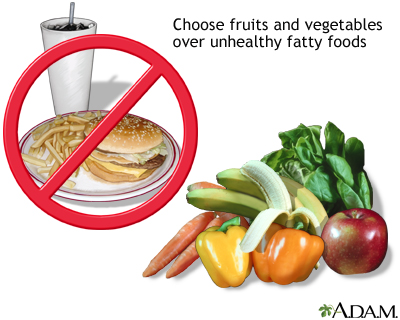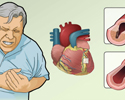Angina - discharge
Chest pain - discharge; Stable angina - discharge; Chronic angina - discharge; Variant angina - discharge; Angina pectoris - discharge; Accelerating angina - discharge; New-onset angina - discharge; Angina-unstable - discharge; Progressive angina - discharge; Angina-stable - discharge; Angina-chronic - discharge; Angina-variant - discharge; Prinzmetal angina - dischargeAngina is a type of chest discomfort due to poor blood flow through the blood vessels of the heart muscle. This article discusses how to care for yourself when you leave the hospital.
- When You're in the Hospital
You were having angina. Angina is chest pain, chest pressure, often associated with shortness of breath. You had this problem when your heart was not getting enough blood and oxygen. You may or may not have had a heart attack.
- What to Expect at Home
You may feel sad. You may feel anxious and that you have to be very careful about what you do. All of these feelings are normal. They go away for most people after 2 or 3 weeks.
You may also feel tired when you leave the hospital. You should feel better and have more energy within 5 weeks after you are discharged from the hospital.
- Activity
Know the signs and symptoms of angina:
- You may feel pressure, squeezing, burning, or tightness in your chest. You may also have pressure, squeezing, burning, or tightness in your arms, shoulders, neck, jaw, throat, or back.
- Some people may feel discomfort in their back, shoulders, and stomach area.
- You may have indigestion or feel sick to your stomach. You may feel tired and be short of breath, sweaty, lightheaded, or weak. You may have these symptoms during physical activity, such as climbing stairs, walking uphill, lifting, and engaging in sexual activity.
- You may have symptoms more often in cold weather. You can also have symptoms when you are resting, or when wake you up from your sleep.
Ask your health care provider how to treat your chest pain when it happens.
Take it easy at first. You should be able to talk easily when you are doing any activity. If you cannot, stop the activity.
Ask your provider about returning to work and what type of work you will be able to do.
Your provider may refer you to a cardiac rehabilitation program. This will help you learn how to slowly increase your exercise. You will also learn how to take care of your heart disease.
- Diet and lifestyle
Try to limit how much alcohol you drink. Ask your provider when it is OK to drink, and how much is safe.
Don't smoke cigarettes. If you do smoke, ask your provider for help quitting. Don't let anyone smoke in your home.
Learn more about what you should eat for a healthier heart and blood vessels. Avoid salty and fatty foods. Stay away from fast-food restaurants. Your provider can refer you to a dietitian, who can help you plan a healthy diet.
Try to avoid stressful situations. If you feel stressed or sad, tell your provider. They can refer you to a counselor.
Ask your provider about sexual activity. Men should not take medicines or any herbal supplements for erection problems without checking with their provider first. These medicines are not safe when used with nitroglycerin.
- Taking your heart medicines
Have all of your prescriptions filled before you go home. You should take your medicines the way you have been told. Ask your provider if you can still take any other prescription medicines, herbs, or supplements you have been taking.
Take your medicines with water or juice. Do not drink grapefruit juice (or eat grapefruit), since these foods may change how your body absorbs certain medicines. Ask your provider or pharmacist about this.
People who have angina often receive the medicines below. But sometimes these medicines may not be safe to take. Talk with your provider if you are not already taking one of these medicines:
- Antiplatelet medicines (blood thinners), such as aspirin, clopidogrel (Plavix), prasugrel (Efient), or ticagrelor (Brilinta)
- Other medicines, such as warfarin (Coumadin), to help keep your blood from clotting
- Beta-blockers and ACE inhibitor medicines, to help protect your heart
- Statins or other medicines to lower your cholesterol
- Calcium-channel blockers
- Nitroglycerin
Never just stop taking any of these medicines. Don't stop taking any other medicines you may be taking for diabetes, high blood pressure, or any other medical problems.
If you are taking a blood thinner, you may need to have extra blood tests to make sure your dose is correct.
- When to Call the Doctor
Contact your provider if you feel:
- Pain, pressure, tightness, or heaviness in the chest, arm, neck, or jaw
- Shortness of breath
- Gas pains or indigestion
- Numbness in your arms
- Sweaty, or if you lose color
- Lightheaded
Changes in your angina may mean your heart disease is getting worse. Contact your provider if your angina:
- Becomes stronger
- Occurs more often
- Lasts longer
- Occurs when you are not active or when you are resting
- If medicines do not help ease your angina symptoms as well as they used to
References
Boden WE. Angina pectoris and chronic ischemic heart disease. In: Goldman L, Cooney KA, eds. Goldman-Cecil Medicine. 27th ed. Philadelphia, PA: Elsevier; 2024:chap 62.
Bonaca MP, Sabatine MS. Approach to the patient with chest pain. In: Libby P, Bonow RO, Mann DL, Tomaselli GF, Bhatt DL, Solomon SD, eds. Braunwald's Heart Disease: A Textbook of Cardiovascular Medicine. 12th ed. Philadelphia, PA: Elsevier; 2022:chap 35.
Gulati M, Levy PD, Mukherjee D, et al. 2021 AHA/ACC/ASE/CHEST/SAEM/SCCT/SCMR Guideline for the evaluation and diagnosis of chest pain: executive summary: A report of the American College of Cardiology/American Heart Association Joint Committee on Clinical Practice Guidelines. Circulation. 2021;144(22):e368-e454. PMID: 34709928 pubmed.ncbi.nlm.nih.gov/34709928/.
Virani SS, Newby LK, Arnold SV, et al. 2023 AHA/ACC/ACCP/ASPC/NLA/PCNA Guideline for the management of patients with chronic coronary disease: A report of the American Heart Association/American College of Cardiology Joint Committee on Clinical Practice Guidelines. Circulation. 2023;148(9):e9-e119. PMID: 37471501 pubmed.ncbi.nlm.nih.gov/37471501/.














